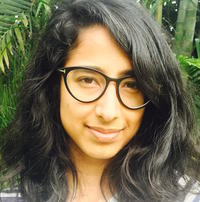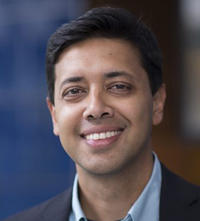 Mayesha Alam
Mayesha Alam
Mayesha Alam’s research interests intersect comparative politics, international relations and international law specifically related to the causes and consequences of armed conflict. Mayesha’s first book, Women and Transitional Justice: Progress and Persistent Challenges in Retributive and Restorative Processes, was published by Palgrave Macmillan in 2014 and she is co-editor of a forthcoming book on Women and Gender Perspectives in the Military to be published by Georgetown University Press. Prior to pursuing her doctoral studies in political science at Yale, Mayesha served as the deputy director of the Georgetown Institute for Women, Peace and Security in Washington, D.C. She has also worked on policy design, implementation, and evaluation with the United Nations, World Bank, and the Organization for Security and Cooperation in Europe.
 Tiraana Bains
Tiraana Bains
Tiraana Bains is a doctoral candidate in the History Department at Yale University. Her dissertation is titled, “The Empires of the English East India Company: Contesting State-Formation, Political Culture and Political Economy in South Asia and Beyond.” The dissertation asks why the British imperial state in South Asia became an increasingly centralizing and exclusionary entity in the second half of the eighteenth century. Her work combines archival research in English and Persian. She received a joint B.A. and M.A. degree from Yale College in 2015.
 C. Austin Davis
C. Austin Davis
Austin is an Assistant Professor of Economics at American University and a Postdoctoral Associate at Yale University. His research focuses on major transitions in developing-country labor markets, e.g. the regulatory and labor-market forces behind a sharp change to agricultural production in Brazil. He is currently involved in two major data collection efforts: Yale EGC’s Tamil Nadu Panel and a representative panel of host and refugee communities in Southern Bangladesh. Other ongoing research projects relate to fertility and women’s labor force participation, retirement reform, and the long-term effects of childhood shocks in a context with child labor.
 Mushfiq Mobarak
Mushfiq Mobarak
Mushfiq Mobarak is a professor of economics at the Yale School of Management. He is a development economist with interests in environmental issues.
Professor Mobarak conducts field experiments exploring ways to induce people in developing countries to adopt technologies or behaviors that are likely to be welfare improving. His ongoing research projects are in Bangladesh, Brazil, Chile, India, Kenya, Nepal and Malawi. His research has been published in journals across disciplines, including Econometrica, Science, The Review of Economic Studies, the American Political Science Review and Demography, and covered by the New York Times, The Economist, Science, NPR, Wired.com, the Times of London, and other media outlets around the world.
 Tanmoy Sharma
Tanmoy Sharma
Tanmoy Sharma studied physics and sociology in Delhi for his bachelors and masters respectively, before joining the PhD program in anthropology at Yale in 2017. In the recent past, he worked on the intersections of water, everyday life and infrastructure in the Brahmaputra valley for his MPhil at Jawaharlal Nehru University. At Yale, he is devising a historical-anthropological study on resource extraction, agrarian transformation and the attendant cultural articulations through a focus on hydrocarbon industries in India’s mineral frontiers, especially in Northeast India.
 Jaya Wen
Jaya Wen
Jaya Wen is a PhD student in the Department of Economics at Yale University. She uses theory-motivated applied empirical tools to answer questions in development economics, political economy, and firm behavior. Her recent work focuses on the political economy drivers of misallocation in China, particularly how social stability motives determine state employment. In her free time, she enjoys cooking, kayaking, writing fiction, and playing soccer.
